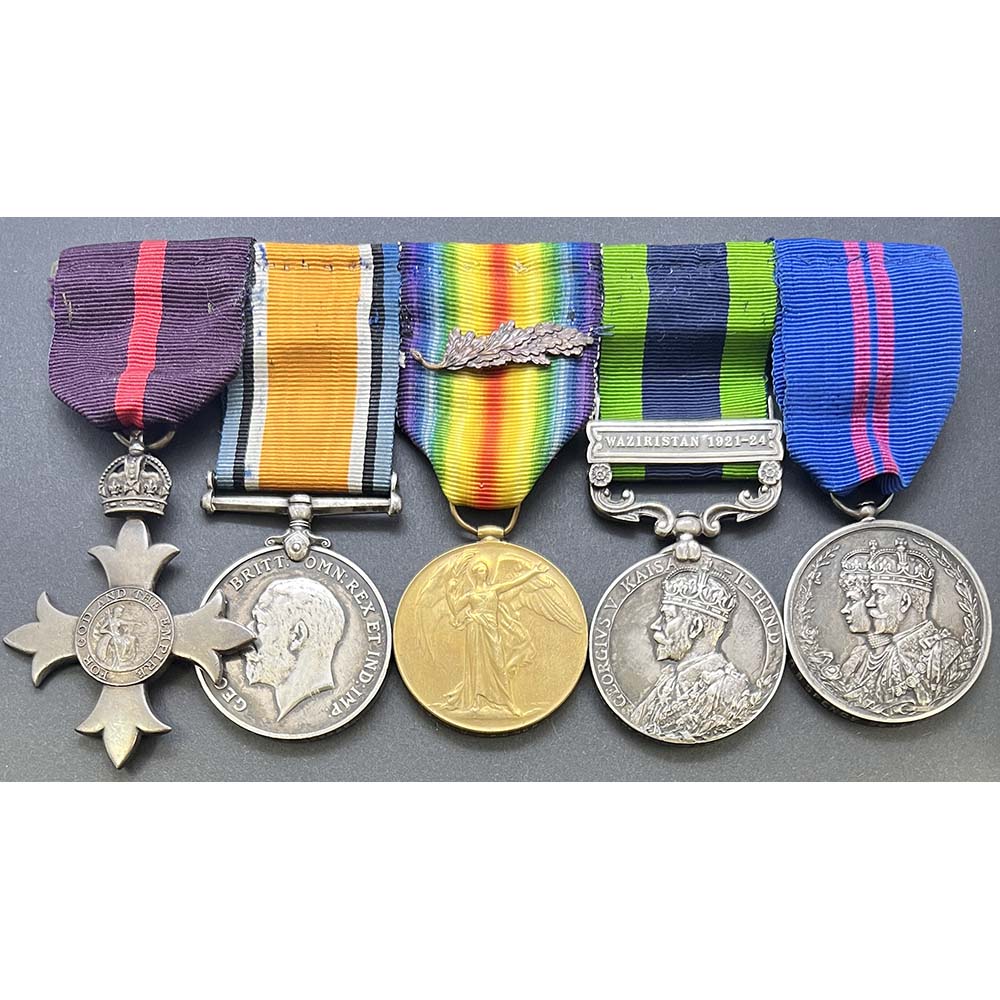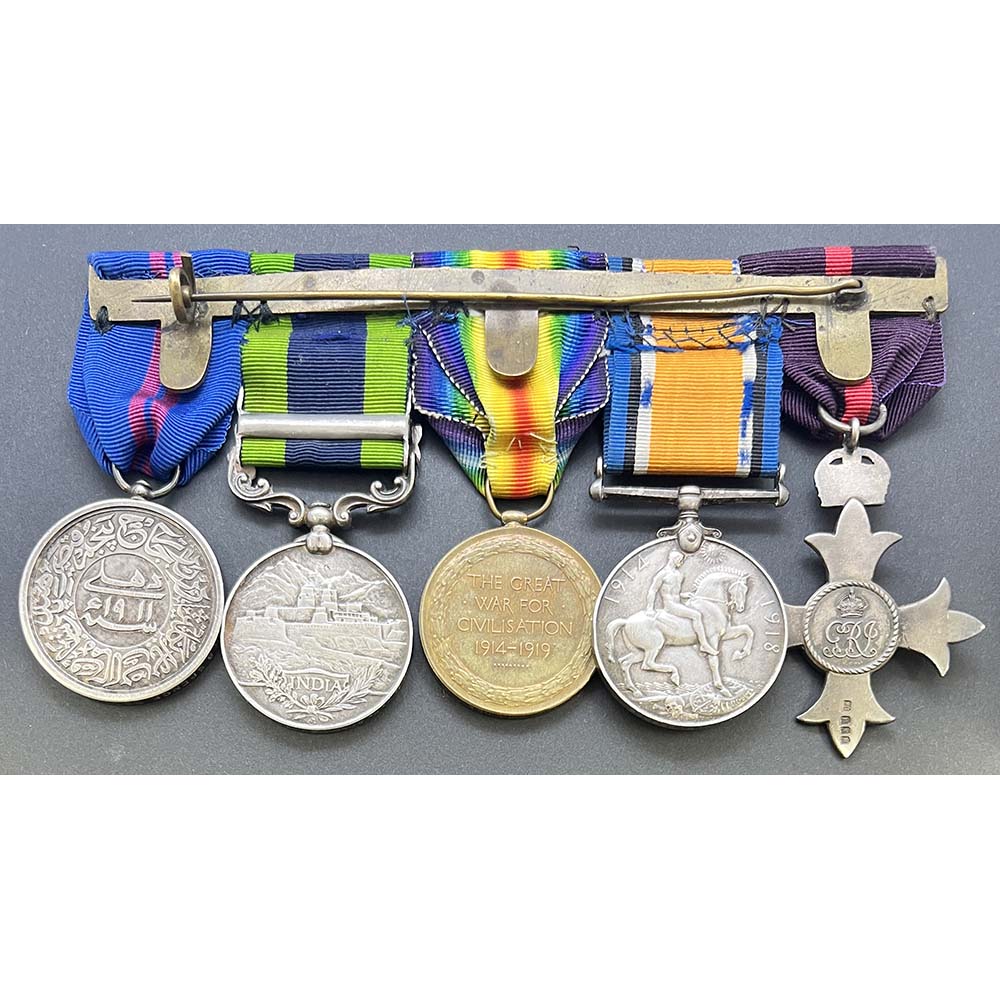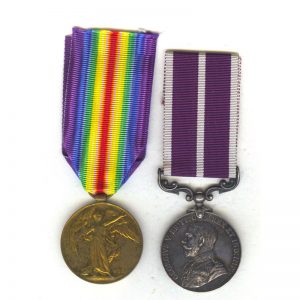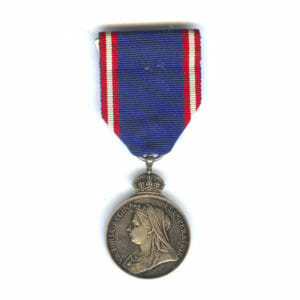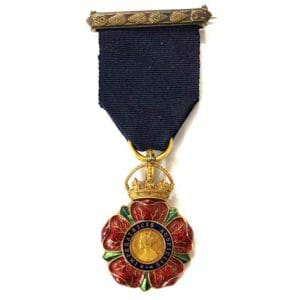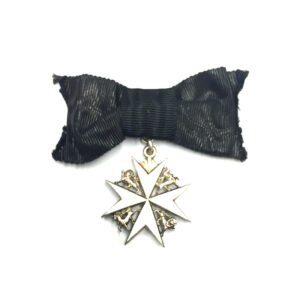Description
Officer of the Order of the British Empire, first type hallmarked, Military Issue, British War and Victory Medal Pair, with MID oak leaf, India General Service Medal 1908, GV, Waziristan 1921-24, Delhi Durbar 1911, Lieut Colonel Richard Bennett Spence, Indian Army, 2-19th Hyderabad Regiment and 96th Berar Infantry.
Lt Col R.B. Spence, who served many years with the 96th Berar Infantry, was a long serving Indian Army Officer, who along side his other Army Roles was for many years the Adjutant of the regiment, also being a Company Commander, and during World War 1 whilst the regiment served in Iraq he was a Deputy Assistant Adjutant and Quartermaster General to the Military Governor.
By 1929, he rose to the Command of his Regiment, as Lt Col Commanding Officer of the 19th Hyderabad Regiment, 10th (Russell’s) Battalion.
For his service in WW1, he would receive 3 Mentions in Despatches and the award of the O.B.E., Military Division.
WW1 Pair officially impressed: “Major R.B. Spence.”
IGS officially impressed: “Major R.B. Spence, 2-19th Hy’bad R.”
Delhi Durbar contemporarily engraved on rim: “Lt R. B. Spence 96th Berar Infantry.”
Delhi Durbar confirmed on the medal roll, being present representing his Regiment the 96th Berar Infantry.
Lieutenant Colonel Richard Bennet Spence, was born in Staffordshire on 8th March 1882.
He was the son of the highly respected Dr James Beveridge Spence MD, an Irish Doctor who had recently moved to Staffordshire to take up the role of Medical Superintendent of the Burntwood Asylum, from 1881-1924.
His father, was said to have been: “fair in complexion, with an open, frank, good-humoured, kindly face, standing some six feet three or four, burly in body and large of limb,’ adding, ‘he has the impressive presence which ought to belong to one in such a position as his.’ “
And A former Pharmacist, David Budden, states in his book, A County Lunatic Asylum: The History of St Matthew’s Hospital Burntwood, that staff remembered Spence as ‘a tall, upright man; a man who could be stern and even harsh,’ but also ‘very generous and who showed deep concern for the welfare of his patients’.
A young Richard was educated at Southlea in Great Malvern, before sent off to Boarding School as a Boy, receiving a top education from Haileybury College in Hertfordshire.
After leaving the school, he was naturally educated at Cambridge University, from there he received his commission into the Army: “Lancashire Fusiliers – 2nd Lt Richard Bennett Spence, from Cambridge Univsersity V.R.C. a University Candiate, 2nd Lt Gazette 28th July 1903.”
His connection with the Indian Army began in 1905, the Military Gazette of Lahore 5th July 1905:
“2nd Lieutenant R.B. Spence, Lancashire Fusiliers, is a candidate for the Indian Army, and is posted to Secunderabad Division.”
He joined the 79th Carnatic Infantry, as a 2nd Lieutenant according to the London Gazette, 3rd Nov 1905.
New to the Army, he was already a Double Company Commander of the 79th by May 1906 before his transfer.
He first joined the 1st 96th Berar Infantry, which he would make his home, on 1st May 1906.
1911 Army Lists Records Lt R.B. Spence as both a Double Company Officer and the Quartermaster to the Regiment.
Appointed as the Quartermaster in May 1908.
During World War 1, he was now a Major of the 96th Berar Infantry, serving with them through the war.
The 96th Infantry saw service in the Mesopotamia Campaign in Iraq from 1916-18.
Promoted to Major and Company Commander on 29th July 1918.
During the war he is recorded as having been a Deputy Assistant Adjutant and Quarter Master General to the Military Governor in Iraq: “Captain R.B. Spence 96th Berar Infantry and Captain A.H. Gwyn, 4th Rajputs.”
For his distinguished service during the war, he received three separate mentions in despatches
London Gazette 12th March 1918
London Gazette 27th August 1918
London Gazette 30th April 1919
At the end of the war, he was decorated with the newly instituted MBE for his Military Service.
Awarded London Gazette
He saw further service in Waziristan with his regiment, which since 1922 had now become known as the 2nd Battalion, 19th Hyerderabad Regiment.
1930 Army List recalls him as Commanding Officer of 19th Hyderabad Regiment, since 13th December 1929, stationed at Benarest, in the Allahabad Brigade Area, Lucknow District.
Finally discharged in the London Gazette 19th March 1937:
“INDIAN REGULAR RESERVE OF OFFICERS, The under mentioned officers, having attained the age limit of liability to recall, cease to belong to the reserve:- Lt-Col R.B. Spence, O.B.E., 8th March 1937.”
He lived a long life into retirement, living around London and in Surrey.
1939 Census lists him as a Retired Lt Col of the Indian Army.
He died in September 1969 in Lewisham, London.
